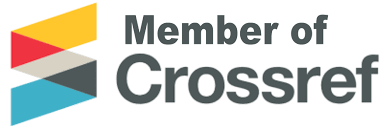Trust in leadership and organizational justice as factors that influence innovative behavior in organizations on an ongoing basis
Abstract
The purpose of this study was to test and analyze the effect of trust in leadership and organizational justice on innovative behavior. this research uses a quantitative approach, the data is obtained using questionnaire techniques. Respondents in this study amounted to 120 employees of foreign investment companies in Malang District. this study has two hypotheses with the analysis test using SEM PLS 4.0. the results of the analysis test in this study. the first hypothesis can be seen that trust in leadership has a significant effect on innovative behavior.The second hypothesis is that organizational justice has a significant effect on innovative behavior.
Full Text:
PDFReferences
Argyris, C. (1970). Intervention Theory & Method: A Behavioral Science View. Reading, Mass.: Addison-Wesley
Coetzee, M. (2006). The fairness of affirmative action: An organisational justice perspective (Doctoral dissertation, University of Pretoria).
Cropanzano, R., Bowen, D. E., & Gilliland, S. W. (2007). The Management of Organizational Justice. Academy of Management Perspectives,21(4),34–48. https://doi.org/10.5465/amp.2007.27895338
Fox, A. (1974). Beyond contract: Work, power and trust relations. Faber.
Greenberg, J. (1987). A Taxonomy of Organizational Justice Theories. Academy of ManagementReview,12(1),9–22. https://doi.org/10.5465/amr.1987.4306437
Greenberg, J. (1990). Organizational Justice: Yesterday, Today, and Tomorrow. Journal ofManagement,16(2),399-432. https://doi.org/10.1177/014920639001600208
Hao, Y., Hao, J., & Wang, X. (2016). The relationship between organizational justice and job satisfaction. Journal of Chinese Human Resource Management, 7(2), 115–128. https://doi.org/10.1108/JCHRM-07-2016-0012
Janssen, O. (2004). How fairness perceptions make innovative behavior more or less stressful. Journal of Organizational Behavior,25(2),201–215. https://doi.org/https://doi.org/10.1002/job.238
Javed, B., Abdullah, I., Zaffar, M. A., Haque, A. ul, & Rubab, U. (2019). Inclusive leadership and innovative work behavior: The role of psychological empowerment. Journal of Management & Organization, 25(4), 554–571.https://doi.org/DOI: 10.1017/jmo.2018.50
Pashkina, M. and Plakhotnik, M.S. (2018), "Mystery shopping through the lens of organizational justice", Industrial and Commercial Training, Vol. 50 No. 3, pp. 109-122. https://doi.org/10.1108/ICT-11-2017-0088
Rosen, B., & Jerdee, T. H. (1977). Influence of subordinate characteristics on trust and use of participative decision strategies in a management simulation. Journal of Applied Psychology, 62(5), 628–631. https://doi.org/10.1037/0021-9010.62.5.628
Schein, E. H. (1969). Process Consultation: Its Role in Organizational Development. Reading. Mass.: Addison-Wesley.
Singh, M., & Sarkar, A. (2019). Role of psychological empowerment in the relationship between structural empowerment and innovative behavior. Management Research Review,42(4),521–538. https://doi.org/10.1108/MRR-04-2018-0158
Shure, G. H., & Meeker, R. J. (1967). A Personality/Attitude Schedule for Use in Experimental Bargaining Studies. The Journal of Psychology, 65(2), 233–252. https://doi.org/10.1080/00223980.1967.10544868
Smith, M. K. (2018). High-involvement innovation: views from frontline service workers and managers. Employee Relations, 40(2),208–226. https://doi.org/10.1108/ER-07-2016-0143.
Sugiono, (2019). Metode Penelitian Pendidikan ( Pendekatan. Kuantitatif, Kualitatif, dan R&D); Alfabeta. Bandung
Welbourne, T. M., Cavanaugh, M. A., & Judge, T. A. (1998). Does the leader make a difference? Relationship between executive leader personality and entrepreneurial firm performance
Yuliana, Selvia Mawar Dani (2024) Pengaruh Keadilan Organisasional Terhadap Perilaku Kerja Inovatif Dengan Kepercayaan Organisasional Sebagai Variabel Mediasi (Studi Pada Karyawan Perbankan Di Solo Raya) - 1952100006. Skripsi Thesis, Universitas Veteran Bangun Nusantara.
DOI: https://doi.org/10.35314/inovbiz.v12i2.4404
Refbacks
- There are currently no refbacks.
Copyright (c) 2024 Dito Wahyutomo, Evi Permatasari, Evi Permatasari

This work is licensed under a Creative Commons Attribution-NonCommercial-ShareAlike 4.0 International License.
This Journal has been listed and indexed in :
Copyright of Jurnal Inovasi Bisnis (p-ISSN : 2338-4840, e-ISSN : 2614-6983)

Inovbiz: Jurnal Inovasi Bisnis is licensed under a Creative Commons Attribution-NonCommercial-ShareAlike 4.0 International License.
Editorial Office :
Pusat Penelitian dan Pengabdian kepada Masyarakat
 Politeknik Negeri BengkalisÂ
Jl. Bathin alam, Sungai Alam Bengkalis-Riau 28711Â
E-mail: inovbiz@polbeng.ac.id














